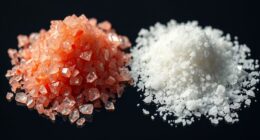Ammonium sulfate is a highly soluble, white, inorganic compound used mainly as a nitrogen fertilizer that provides quick nutrient release and sulfur to support plant growth. It also helps improve soil pH, soil structure, and root health. Beyond agriculture, it’s valuable in industrial processes, water treatment, and chemical synthesis. Its affordability and versatility make it a popular choice across various applications. To discover more about its features, functions, and diverse uses, keep exploring further.
Key Takeaways
- Ammonium sulfate is a highly soluble, crystalline inorganic compound used mainly as a nitrogen and sulfur fertilizer.
- It promotes plant growth by providing quick-absorbing ammonium ions and supporting protein synthesis.
- Widely used in industrial processes like dye, explosive, and paper manufacturing, and in water treatment for pH adjustment.
- Its applications include agricultural fertilization, soil conditioning, and as a reagent in laboratory crystallization and chemical analyses.
- Safe, stable, and cost-effective, it is suitable for various application methods such as broadcasting, banding, and fertigation.

Have you ever wondered how ammonium sulfate plays an essential role in agriculture and industry? This inorganic compound is widely valued for its unique features and versatile functions. As a crystalline, white, odorless substance, ammonium sulfate’s primary characteristic is its high solubility in water. This makes it easy to dissolve and apply in various settings. Its chemical formula, (NH₄)₂SO₄, reflects its composition of ammonium and sulfate ions, which are crucial for its applications. The compound’s relatively low cost and effectiveness have made it a popular choice among farmers and industrial users alike.
In agriculture, ammonium sulfate serves mainly as a nitrogen fertilizer. Nitrogen is vital for plant growth, influencing everything from leaf development to seed production. When you apply ammonium sulfate to the soil, it quickly releases ammonium ions, which are readily absorbed by plant roots. This rapid availability helps promote vigorous growth and healthy development, especially in crops that demand a quick nitrogen boost. Furthermore, ammonium sulfate supplies sulfur, another essential nutrient that supports protein synthesis and enzyme function in plants. The dual supply of nitrogen and sulfur makes it an efficient fertilizer, reducing the need for multiple applications. Its acidic nature also helps counteract soil alkalinity, improving pH balance and nutrient uptake, especially in alkaline soils. Additionally, the solubility in water of ammonium sulfate facilitates uniform distribution and quick nutrient release, enhancing its effectiveness in various soil types. Its use in soil conditioning further improves soil structure and promotes better root development, benefiting crop yields over time. The application methods for ammonium sulfate include broadcasting, banding, or fertigation, making it adaptable for different farming practices.
Beyond agriculture, ammonium sulfate finds a broad range of industrial uses. In the chemical industry, it acts as a raw material for producing other compounds, including ammonium alum and other sulfate salts. It’s also used in the manufacturing of dyes, explosives, and paper products. Its cost-effectiveness makes it a favored choice for large-scale applications, especially in developing regions. In environmental applications, ammonium sulfate can be employed in water treatment processes to remove impurities or adjust pH levels. Its ability to act as a source of sulfate ions is valuable for various chemical syntheses and processes.
You’ll also find ammonium sulfate in the food industry, where it functions as a food additive and a yeast nutrient in bread and brewing. Its stability and safety make it suitable for these applications. Additionally, it plays a role in laboratory settings, serving as a reagent for crystallization and other chemical analyses. Proper storage and handling are essential to maintain its stability and prevent contamination, especially in sensitive industrial or laboratory environments.
Frequently Asked Questions
Is Ammonium Sulfate Environmentally Safe for Long-Term Soil Use?
You might wonder if ammonium sulfate is safe for long-term soil use. While it’s an effective fertilizer, overuse can lead to soil acidification and nutrient imbalances. If you apply it responsibly and in moderation, it can be safe. However, excessive or improper application may harm soil health and the environment over time. Always monitor soil conditions and follow recommended guidelines to guarantee safe, sustainable use.
How Does Ammonium Sulfate Compare to Other Nitrogen Fertilizers?
You might wonder how ammonium sulfate stacks up against other nitrogen fertilizers. It’s cost-effective and provides quickly available nitrogen, making it ideal for crops needing rapid growth. Unlike urea, it’s less prone to volatilization, but it can acidify soil over time. Compared to nitrate fertilizers, ammonium sulfate releases nitrogen more slowly, giving you better control. Overall, it’s a reliable choice, especially when soil acidity and cost are considerations.
Can Ammonium Sulfate Be Used in Hydroponic Systems?
Yes, you can use ammonium sulfate in hydroponic systems. It dissolves quickly in water, providing a readily available nitrogen source for your plants. Just make certain you carefully manage its concentration to avoid nutrient imbalances or pH issues, as ammonium sulfate can lower pH. Regular monitoring and proper dosage help optimize plant growth, making it an effective fertilizer option in hydroponic setups.
What Precautions Are Necessary When Handling Ammonium Sulfate?
When handling ammonium sulfate, you need to take certain precautions to stay safe. Always wear gloves, goggles, and a mask to avoid skin contact and inhalation of dust. Work in a well-ventilated area, and avoid eating or drinking nearby. Store it in a cool, dry place, away from children and pets. Be careful during mixing and handling to prevent spills and accidental exposure.
Are There Any Health Risks Associated With Ammonium Sulfate Exposure?
Did you know that prolonged exposure to ammonium sulfate can cause respiratory irritation and skin discomfort? You should be cautious because inhaling dust may lead to coughing or sore throat, and skin contact might cause irritation. Always wear protective gear like masks and gloves when handling it. If you experience symptoms, seek fresh air and consult a healthcare professional. Safety precautions help minimize health risks associated with this compound.
Conclusion
Understanding ammonium sulfate’s features and functions reveals its dual nature: a essential fertilizer supporting plant growth and a chemical compound with industrial uses. Its versatility contrasts with its simplicity, highlighting how a single substance can serve both agricultural and manufacturing needs. By appreciating this juxtaposition, you see how ammonium sulfate’s applications shape ecosystems and industries alike, proving that even the most straightforward compounds hold complex, interconnected roles in our world.









